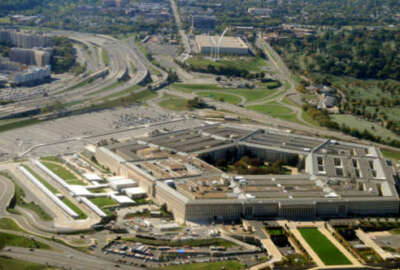

The government's motion indicates DoD has new reasons to suspect JEDI was afflicted by an improper conflict involving Deap Ubhi, who worked for AWS both before and...
Newly-released court documents shed additional light on the Defense Department’s abrupt request to delay the court case challenging its multibillion dollar JEDI Cloud solicitation, and make clear that a new Pentagon investigation into possible conflicts of interest involving Amazon Web Services will postpone the contract’s final award by at least three months.
A partly-redacted version of DoD’s motion, filed at the Court of Federal Claims Friday evening, indicates that the department’s new concerns about conflicts involve a specific former employee of the Defense Digital Service, Deap Ubhi.
The portions of the document describing the specifics of the new discoveries were redacted, but the government said they involve information that DoD’s JEDI’s contracting officer, Chanda Brooks, wasn’t aware of until last week.
Based on that information, Brooks is conducting a new investigation into whether Ubhi’s connections to Amazon Web Services improperly affected the procurement.
Last July, Brooks had certified that his involvement didn’t constitute improper influence on JEDI planning decisions.
But in an affidavit attached to Friday’s filing, she wrote that her previous finding was based on her “understanding” that Ubhi had recused himself from JEDI matters on Oct. 31, 2017, after AWS had indicated an interest in buying Tablehero, a startup company he had founded.
The filing’s subsequent paragraph, presumably describing the new information Brooks received last week, was blacked out.
“In light of this new information, I am re-opening my earlier investigation and reconsidering my earlier no impact determination with regard to Mr. Ubhi,” she wrote immediately after the redacted text.
DoD’s new filing does not identify the source of the information, but the date it specified – Feb. 12 – was the same day Oracle, the plaintiff in the lawsuit, filed an extensive motion detailing its allegations of conflicts of interest involving Ubhi, a former and current AWS employee, and Anthony DeMartino, a former AWS consultant.
In that filing, Oracle alleged, for example, that even though the department had “revoked” Ubhi’s access to JEDI planning data when he recused himself, he had already synced the Google Drive that contained that information to his own laptop.


“Several months into JEDI, and with knowledge of Ubhi’s position and broad access to JEDI government and competitor information, AWS rehired Ubhi,” Oracle attorneys wrote. “Ubhi managed untold amounts of non public and acquisition sensitive JEDI-related information based on his unlimited access to the acquisition’s Google drive. Ubhi held highly technical meetings with potential JEDI competitors about their cloud computing capabilities.”
Oracle alleges that while he was at DDS, Ubhi was the leading advocate for DoD’s decision for the department to pursue a single-award approach for the up-to-$10 billion contract, including by drafting the “problem statement” which ultimately convinced DoD leadership that JEDI’s goals could not be achieved with multiple clouds.
“Although we disagree with these characterizations, we do not dispute that Mr. Ubhi participated in early discussions regarding the single-award approach and potential JEDI requirements,” government attorneys wrote in the motion released Friday.
The new filing also indicates that the department is conducting not one, but two conflict-of-interest investigations involving AWS and JEDI.
Besides reopening the investigation into whether Ubhi’s involvement in the JEDI planning process was improper, Brooks confirmed that she had already started a separate inquiry into whether AWS created a second organizational conflict of interest (OCI) by re-hiring Ubhi after he had already participated in the procurement.
“I intend to complete the OCI investigation and issue a determination prior to issuing a competitive range determination,” she wrote.
For its part, Oracle contends that the alleged OCI issue should disqualify AWS from the procurement entirely.
“The contracting officer had all the relevant facts necessary to perform the investigation when DoD first learned that Ubhi rejoined AWS. The record makes clear that Ubhi was a member of the four-person team leading the JEDI acquisition during fall 2017; AWS and Ubhi engaged in employment discussions during fall 2017; AWS knew Ubhi’s role on JEDI; and that AWS rehired Ubhi as its General Manager in fall 2017,” the company wrote. “The CO’s failure to timely investigate and mitigate this AWS conflict lacked a rational basis and violated the (Federal Acquisition Regulation).”
Amazon, which has joined the federal court case as an intervenor, strongly disputes Oracle’s conflict of interest claims, calling them “wildly overstated.”
In its own filing last month, it defended many of the actions DoD has taken on JEDI, and what it described as “limited” involvement by Ubhi and Demartino.
“Oracle’s characterizations of Mr. Ubhi’s role and ‘significance’ in driving key decisions and drafting the gate criteria for this procurement are grossly inaccurate,” attorneys for AWS told the court. “Neither Mr. Ubhi nor Mr. DeMartino was the decision-maker for any of the agency decisions challenged in Oracle’s protest. Nor has Oracle alleged bias on the part of any of the actual decision-makers. Nor has Oracle provided this court any legitimate basis to question the veracity of the decision-makers’ official Rationale, Determination, and Justification analyses.”
Judge Eric Bruggink has ordered the government to report back to the court within five days after DoD completes its renewed conflict of interest investigation.
In its filing, DoD said it intends to take several additional steps once Brooks completes her investigation.
Even if she decides Ubhi’s possible conflicts still did not play a role in the procurement after considering the new evidence, a senior official at DoD’s Washington Headquarters Service who is assigned to review “no impact” determinations will take a second look.
And Brooks said she will not make any decisions about whether any of the prospective bidders are qualified for the JEDI contract until after WHS renders its verdict, adding that the final contract will not be awarded until at least 90 days after that decision has been been made.
Copyright © 2025 Federal News Network. All rights reserved. This website is not intended for users located within the European Economic Area.
Jared Serbu is deputy editor of Federal News Network and reports on the Defense Department’s contracting, legislative, workforce and IT issues.
Follow @jserbuWFED
